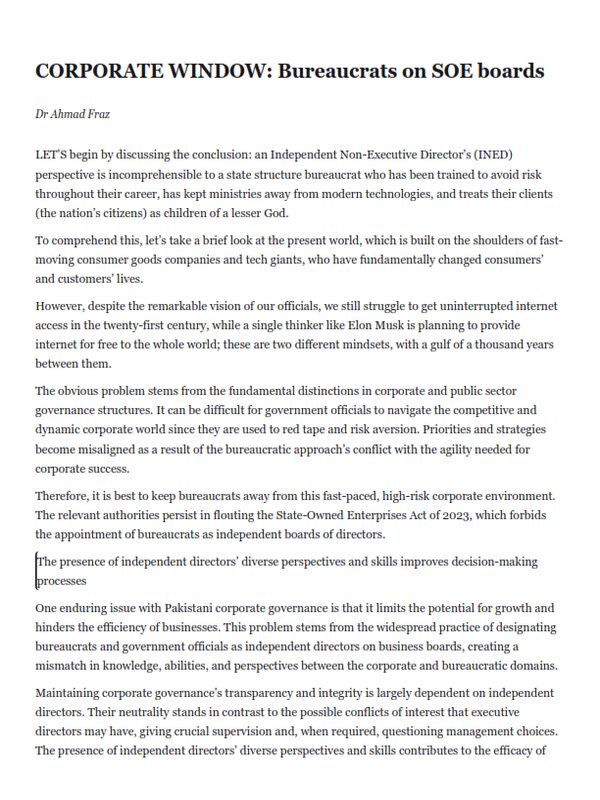CORPORATE WINDOW: Bureaucrats on SOE boards
LET’S begin by discussing the conclusion: an Independent Non-Executive Director’s (INED) perspective is incomprehensible to a state structure bureaucrat who has been trained to avoid risk throughout their career, has kept ministries away from modern technologies, and treats their clients (the nation’s citizens) as children of a lesser God.
To comprehend this, let’s take a brief look at the present world, which is built on the shoulders of fast-moving consumer goods companies and tech giants, who have fundamentally changed consumers’ and customers’ lives.
However, despite the remarkable vision of our officials, we still struggle to get uninterrupted internet access in the twenty-first century, while a single thinker like Elon Musk is planning to provide internet for free to the whole world; these are two different mindsets, with a gulf of a thousand years between them.
The obvious problem stems from the fundamental distinctions in corporate and public sector governance structures. It can be difficult for government officials to navigate the competitive and dynamic corporate world since they are used to red tape and risk aversion. Priorities and strategies become misaligned as a result of the bureaucratic approach’s conflict with the agility needed for corporate success.
Therefore, it is best to keep bureaucrats away from this fast-paced, high-risk corporate environment. The relevant authorities persist in flouting the State-Owned Enterprises Act of 2023, which forbids the appointment of bureaucrats as independent boards of directors.
The presence of independent directors’ diverse perspectives and skills improves decision-making processes
One enduring issue with Pakistani corporate governance is that it limits the potential for growth and hinders the efficiency of businesses. This problem stems from the widespread practice of designating bureaucrats and government officials as independent directors on business boards, creating a mismatch in knowledge, abilities, and perspectives between the corporate and bureaucratic domains.
Maintaining corporate governance’s transparency and integrity is largely dependent on independent directors. Their neutrality stands in contrast to the possible conflicts of interest that executive directors may have, giving crucial supervision and, when required, questioning management choices. The presence of independent directors’ diverse perspectives and skills contributes to the efficacy of the board and improves decision-making processes.
Dr Nadeem ul Haque’s recent research from the Pakistan Institute of Development Economics (Pide) clarifies important topics regarding corporate governance and Pakistan’s financial markets. Key findings indicate that the boards are made up of similar individuals: corporations, families of business founders, retired and active civil servants, members of the armed forces, and a sizable portion of non-executive directors with prior government experience.
One example of this incongruence is evident in the case of Security Papers Limited (SPL), where more than 50 per cent of shareholdings are by the Government of Pakistan, including a 40pc holding of a company indirectly owned by the State Bank of Pakistan through Pakistan Security Printing Corporation Ltd.
The current board, which has been overseeing SPL’s operations by including government officials as independent directors, will persist in managing the company long after its tenure ended in September 2023.
The recent adjournment of the Extraordinary General Meeting (EOGM) of Security Papers Limited and Security and Exchange Commission Pakistan (SECP), citing its status as a public sector company and a state-owned enterprise, raises serious concerns about the credibility of regulatory bodies.
In a classic case of poor governance, the disqualification of government officials by SECP order did not deter the continuation of their influence on SPL’s board. The lack of efficient regulation and accountability from governmental organisations and regulators exacerbates the problem.
The State Bank of Pakistan, SECP, and Ministry of Finance must critically examine their nominating processes and evaluate whether individuals with the requisite corporate experience and understanding of business dynamics are being appointed.
The nomination of directors lacking board experience without adhering to the fit and proper criteria is a profound example of the need for a thorough review of the governance structure.
It is imperative that INED be appointed in spite of these obstacles. These professionals are essential for negotiating the complex dynamics of the business world because they are knowledgeable about organisational agility, competitiveness, and effective resource allocation.
It is not only a question of organisational effectiveness to adopt a corporate governance model that incorporates INEDs, skilled professionals, and corporate leaders; it is also an essential step in creating a cooperative relationship between corporations and the government, which will eventually drive Pakistan’s economy toward sustainable growth. The expansion of firms is crucial to bolstering the status of the economy as a whole in the dynamic field of global economics.
Multinational companies (MNCs) are becoming as powerful as states in industrialised nations, actively participating in policy-making processes in addition to fostering economic growth. These countries’ business leaders have brought MNCs to a level where they can work with governments, offering effective inputs that support well-informed policy decisions.
Sadly, Pakistan is not as quick to adopt this game-changing strategy. Distinctive bureaucratic practices and the selection of unsuitable executives for corporate boards impede the nation’s capacity to fully utilise the potential of enterprises in aiding in the creation of policies and fostering economic expansion.
Adopting a corporate governance model in line with global best practices is essential for building synergistic relationships between firms and is not merely an issue of organisational efficiency and the state, ultimately propelling Pakistan towards sustainable economic development.
The writer is an assistant professor at the Pakistan Institute of Development Economics, Islamabad.
X: @aahmadfraz
Published in Dawn, The Business and Finance Weekly, February 19th, 2024




